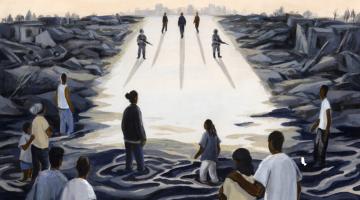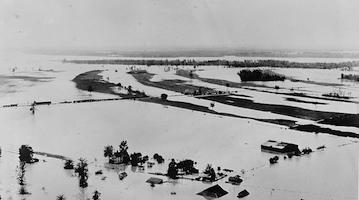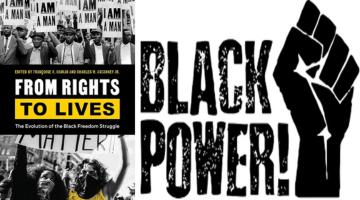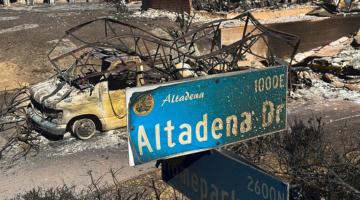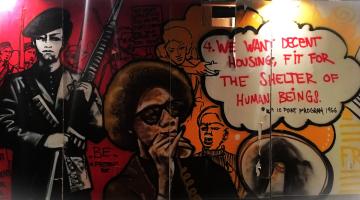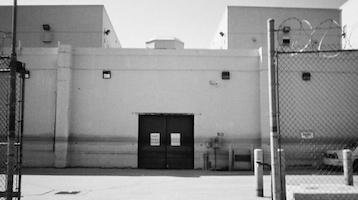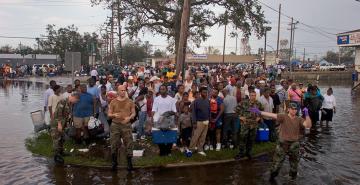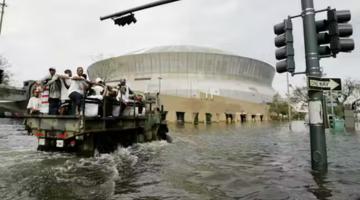Jaribu Hill, Executive Director of the Mississippi Workers’ Center for Human Rights, recounts the aftermath of Hurricane Katrina on the Gulf Coast and the efforts to organize on behalf of the people.
When I got the call, I was just leaving Magnolia Bar’s Summit at Tougaloo College. It was one of the courageous Ingalls Shipyard workers, whom I had the honor of representing in a race discrimination case. We were advised not to try to come back to the coast. Hurricane Katrina had touched down and the roads are blocked. Our clients packed up our hotel rooms and put our belongings in storage. What followed were harrowing calls and text messages, describing widespread loss of homes, deaths, evictions and injuries. The levies had broken! The sagging infrastructures gave way. Lives already hit hard from other storms and inequities, were once again embattled. It is no surprise that those who had very little to begin with, were the ones who were abandoned by the system.
For the privileged elite, wealthy white homeowners, rebuilding was guaranteed. They would recover with the speed and ease their privilege afforded them. But for everyone else, insurance claim denials, sparse to nonexistent relief—food, shelter, medicine, healthcare, jobs—all submerged in the treacherous waters of neglect and callous disregard. As revolutionaries, we had no time to wring our hands and do the “woe is me.” With no time to waste, we got to work. On day two , we established the Southern Relief Fund to support our grassroots relief efforts. Even before donations began to roll in, we organized a relief effort. We sent a truckload of food, hibachi grills, water and cash to our clients and other members of the impacted communities on the Mississippi Gulf coast. We organized our legal team that included interns and attorneys from Mississippi to New York City to California.
Our first target was the Haven apartment complex in Gulfport, where residents received unmarked hand written eviction notices. These notices cited hurricane Katrina as the reason for the forced evacuation. We recruited an amazing local organizer, Gwen Buckhalter, to help us mobilize the tenants for a powerful anti-eviction action. Tenants, whose homes had not been damaged, stopped the property owner from wrongfully removing them from their homes to warehouse the units and then put them back on the market as high priced luxury rentals. In solidarity with Bill Quigley, People’s Attorney and law professor, we organized the next act of resistance. Law students from the Mississippi Project of the City University of New York School of Law, UCLA and Arizona State, joined with displaced local residents, who were threatened with eviction from the Quality Inn in New Orleans. Hotel owners stated they were evacuating to prepare for special events, the annual Mardi Gras celebration! The team drafted a Motion for Preliminary Injunction, which Bill Quigley took to a judge and got signed. Eviction halted. In retaliation for the legal defeat, the hotel manager ordered staff to move out the furniture, including beds from the occupied rooms. We learned of this when displaced persons ran to find us and let us know what was happening. We stormed the management office, with local media standing by. We demanded that all room furnishings be returned or we would expose these acts of callous disregard on all media outlets! Furnishings miraculously reappeared in every room!
The following are other concerted efforts that led to local victories against evictions, workers rights abuses, wrongful denial of insurance claims and forced governmental accountability.
The Southern Relief Fund, established by the Mississippi Workers Center for Human Rights organized relief tours to provide food, bicycles, school backpacks and benefits counseling. The Witness Delegation established by the Mississippi Workers Center for Human Rights, organized site visits and legal actions. The US Human Rights Network established a Media Center in Biloxi that featured testimony, stories and calls to action. Renowned activists, including Martin Luther King III, were interviewed. These interviews went viral and helped to inform the world about the atrocities and the government’s failure to provide equal protection for Black and brown Katrina survivors. This effort was led by Ajamu Baraka. We joined with local residents of the Mississippi Gulf Coast to hold a march for just and equitable recovery. We picketed the Beau Rivage hotel In Biloxi to heighten awareness about the swift response to corporate recovery versus the slow to non-responses experienced by the vast majority of local residents across the Gulf Coast. There were national solidarity efforts by New York City activists, including Brenda Stokely and the Workers World Party.
In powerful displays of unity and collective concern support came pouring in. These grassroots efforts struck blow after blow against the capitalist machine and its agents and agencies. They served to expose the Federal Emergency Management Agency (FEMA) and other federal entities for blatant discriminatory practices. Whole communities suffered from this unequal distribution of wealth and resources, resources owed to suffering communities. Corporate bosses forced workers to work without protection for long hours under the threat of termination.
Wind or water!
insurance claims were denied for trumped up reasons! This forced many to permanently leave their homes and relocate to parts unknown with no right to return, traveling away to start over with nothing. That’s capitalism—the enemy of the sufferers.
On October 28, 2005 I testified before the Leadership Conference on Civil Rights Education Fund (LCCREF) briefing on hurricane Katrina in Washington and entitled my remarks, “Katrina Then and Now.”
“Long before August 29th, Mississippi was the poorest state in the union (especially poor in the Delta region with 43% of the population living in poverty), tying only with Louisiana and the Appalachia region. Folks already had been dropped from the medicaid rolls and left to fend for themselves without safety nets, bank accounts, FEMA cards or food for the next day. Long before August 29th, most people never were gainfully employed or properly educated, clothed or housed. Long before August 29th, thousands of Black children sat in Jim Crow classrooms, gazing out windows, looking at landscapes of desolation and hopelessness-dreaming about lives they saw on TV.”
I put my thoughts into verse with this poem written on October 16, 2005.
“The Fire This Time
The Wrath of the Suffering Mass”
Jaribu Hill
Poet Trouble Maker October 16, 2005
I write haikus to teach small lessons about big problems in the world
of sacrifices and suffering
of mouths to feed without food of sickness without medicine
of misery without relief that lingers
without shifting
set in its way of
unfair distribution
who decides
who gets attention
when cameras turn zoom focus
who gets to know about the
ones who will never be heard from again
death by drowning
death by "somebody" can't see me go under
somebody is not watching
to see
me
go under
somebody is not watching
to see
us
to see
tiny souls take flight
before growing
before really breathing free somebody is not watching
to see
us
go under
search for us somebody search for us somebody do not just bag and tag unknown unknown search for the names
search for the faces
search for those who were born invisible
never made the news
never part of the story always broke
dislocated
shackled to a living death
extreme poverty
plays the race card
all the isms collide
to maintain an uneasy order
a swelling tide of don't think it will always be this way for those
who wait in the shadows behind the walls
in fields of backbreaking toil
in hotels cleaning making nice for
bloated mercenaries who do not see them
never touch them
walk fast past them
hurry
don't look
quick
make a drink
drown in shame
knowing you have more than your share
walk stagger past those who once were invisible now disappeared
Jaribu Hill is the Founder and Executive Director of the Mississippi Workers’ Center for Human Rights and a member of the Black Alliance for Peace Coordinating Committee. She is also the Founding Convenor of the Southern Human Rights Organizers Conference and is a Human Rights Attorney and Cultural Worker.




